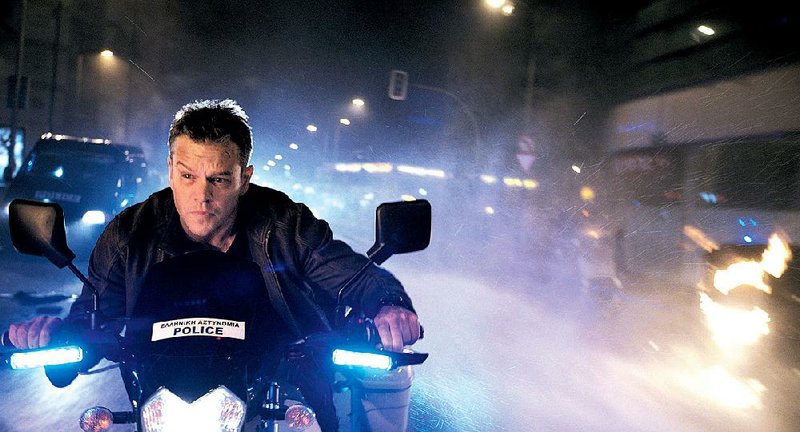Jason Bourne (Matt Damon) was, in a way, the perfect movie hero for the George W. Bush era, at least as far as opponents of Bush were concerned.
There's a reason he disappeared for most of the Obama administration, a time when concern about executive branch and security state overreach suddenly became less important to half of the population (and much of the news media). And one wonders if it makes sense to bring him back now, given the constant stream of terror attacks and news alerts about incompetence on the digital front from our elected officials.
Beloved by liberals because he was a skeptic of the American security state and focused his energies on the corruption at its heart rather than the terrorists our intelligence apparatus was trying to stop, Bourne gave voice to the resurgent paranoid style in American cinema so popular during Dubya's later years. This came as a bit of a surprise: Rather than flag-waving, gun-toting, terrorist-killing cinematic icons in the wake of 9/11, the enduring image of the movies from this time is far more dour.
Or, as Ross Douthat put it in an insightful 2008 column for the Atlantic: "We expected John Wayne; we got Jason Bourne instead." And Bourne was unlike anything American audiences had seen since the post-Watergate paranoia of flicks like The Parallax View.
"Matt Damon's Bourne marries the efficiency of James Bond to the politics of Noam Chomsky," Douthat wrote. "He's imperial overreach and blowback personified -- the carefully brainwashed product of a covert CIA program who goes off the reservation and starts taking down his superiors, a succession of jowly, corrupt agents of the American empire."
Bourne was the perfect symbol for the half of the American electorate that didn't just dislike George W. Bush but also distrusted him. It was a blockbuster for the "Bush Lied, People Died" set, the crowd that believed the Military-Industrial Complex wanted to keep us scared to keep them in power.
There was undoubtedly a constituency for that sort of movie, especially when the second and third entries in the Bourne series hit theaters in 2004 and 2007. And you could argue that the paranoid style never went totally out of vogue -- its targets just shifted somewhat.
Marvel's Captain America films have adopted a cynical and conspiratorial tone, with the America-backed regime of national security embodied by the Avengers and SHIELD being infiltrated by the Nazi-linked HYDRA. Kingsman: The Secret Service suggested the global elite was conspiring to arrange for the masses to murder one another in an orgy of bloodshed so as to reduce the global population, a reactionary bit of filmmaking likely to resonate with those aboard the Trump Train and the Bernie Bus. And then there's the Mission: Impossible series -- seen most recently in 2011 and 2015 -- which remains a hotbed of double-dealing and untrustworthy national security agencies.
While those films all reflect a general angst about the average person's inability to control the world around him, Jason Bourne triggers a far more specific brand of anxiety: Your government is watching you, tracking you and willing to end you if you displease it.
The film's plot is convoluted (as is the case with Bourne's adventures), but boils down to a relatively simple fear: that the government is all-seeing and all-powerful and ever-interested in finding ways to expand its reach. That's why, in this film, CIA head Robert Dewey (Tommy Lee Jones) tries to force a social media mogul to provide him with a backdoor that allows the Central Intelligence Agency access to all your raw info. Metadata isn't good enough anymore, as the terrorists have evolved. The government needs everything -- to keep you safe, of course.
Meanwhile, Bourne is trying to figure out his origins and, in the process, comes into contact with a Julian Assange-style hacker who wants to leak all of the CIA's secrets. "We both want to take down the corrupt institutions that control society," says Christian Dassault (Vinzenz Kiefer). It's not clear if Bourne agrees, and much of the film is centered on his moral struggle: Should he come in from the cold or carry on his fight against the agency that turned him into a mass murderer?
While watching, though, I couldn't help but wonder if this is truly reflective of today's national mood. Given the current ruling party's email follies -- Hillary Clinton's denunciation by the head of the FBI for mishandling State Department emails; the Democratic National Committee being hacked by a foreign power in order to influence our presidential election -- I think it's safe to say that the image of a technologically competent and omnipotent government has been tarnished a bit.
Later in the film, Dewey suggests that the CIA frame a "lone wolf" for an assassination, a rather tone-deaf plot point in a counterterrorism landscape rife with lone wolves. Are people really more worried about the government poking around in the direct messages of suspected terrorists than they are about stopping a jihadi from blowing up a mall or shooting up another nightclub or detonating a suicide bomb on a bus or a train or a plane?
Outside of a rather vocal contingent on Twitter still puffing up Edward Snowden, I can't imagine they are. Maybe Jason Bourne should have stayed retired. Or, at the least, updated his shtick.
MovieStyle on 08/05/2016
